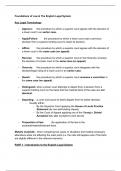Key Legal Terminology
- Approve: the procedure by which a superior court agrees with the decision of
a lower court in an earlier case.
- Apply/Follow: the procedure by which a lower court uses a previous
decision from a superior binding court to reach its decision.
- Affirm: the procedure by which a superior court agrees with the decision of
a lower court in the same case (on appeal).
- Reverse: the procedure by which a superior court in the hierarchy reverses
the decision of a lower court in the same case (on appeal).
- Overrule: the procedure by which a superior court disagrees with the
decision/legal ruling of a lower court in an earlier case.
- Quash: the procedure by which a superior court reverses a conviction in
the same case (on appeal).
- Distinguish: when a lower court attempts to depart from a decision from a
superior binding court on the basis that the material facts of the case are not
identical.
- Departing: a court (not bound to itself) departs from its earlier decision.
- Usually either:
- By the Supreme Court applying the House of Lords Practice
Statement (its non-self-binding clause)
- By the Court of Appeal applying one of the Young v. Bristol
Aeroplane Co. Ltd. exceptions (see above)
- Proposition of law: the application of the law to the
essential/material/relevant facts.
Mutatis mutandis - when comparing two cases or situations and making necessary
alterations while not affecting the main point (i.e. the ratio still applies even if the facts
are slightly different in the relevant scenario)
PART 1 - Introduction to the English Legal System
,Introduction to the Law of England & Wales:
- The English Legal System operates in England AND Wales.
- Public vs private law:
- Public:
- Constitutional & Administrative
- Criminal
- Private:
- Equity - based on duties owed to other individuals on the basis of
‘conscience’ - internal sense of right and wrong.
- Contract - agreements between individuals.
- Tort - obligations individuals owe each other not to commit civil
wrongs, not voluntarily assumed like in contract.
- Land - overlaps with contract law and the duties are owed by
individuals to each other (e.g. buying or renting).
- Company - duties and rights of companies, and their owners,
although heavily regulated by statute.
- Both:
- EU - covers relations btw individuals, and individuals and states.
- 3 elements of English Law:
- Equity - law made by courts
- Common Law - law made by courts
- Statute - law made by parliament
- Government - the Executive (makes and implements policy)
- Parliament - the Legislature (passes legislation into Acts)
- Courts - the Judiciary (decide on legal disputes)
- Equity: supplements the common law by protecting against unfair results -
‘unconscionability’. Historically dispensed in the Court of Chancery.
- Types of court:
, - Court of first instance:
- Magistrates’ Court
- Crown Court (highest court of first instance in criminal cases,
although appeals from magistrates’ too)
- County Court
- Family Court
- Appeals court:
- Court of Appeal
- Supreme Court
- Both:
- High Court
- Civil cases:
- County Court
- Family Court
- Criminal cases:
- Magistrates’ Court
- Crown Court
- Both:
- Supreme Court
- Court of Appeal
- High Court
Types of Legal Rules
- Criminal vs. Civil Law
- Criminal: exists to punish people and deter others. Consists of the state
bringing a case against individuals.
- Civil: exists to compensate those who have suffered a loss, either via a
tort or a contract.
Legislation




